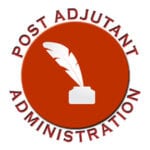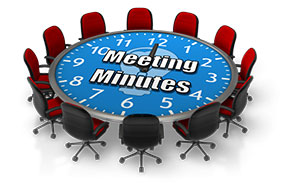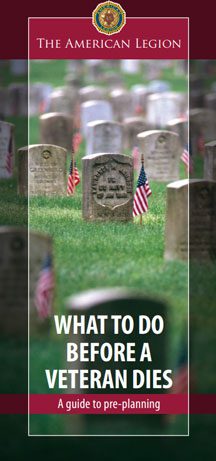Adjutant Resources
Adjutant’s Job
The Adjutant’s job, whether serving at the post, district, or area level, has far-reaching administrative responsibilities that are vitally important to the long-term success of The American Legion. Whether the Adjutant is seen as the Post’s secretary or the first sergeant, it is the Adjutant who ensures we maintain compliance with Legion reports necessary to keep our charter an compliance with government agencies necessary to maintain our tax-exempt and non profit status. The Adjutant is also a key leader members question about meetings, activities, membership, dues and a wide variety of other important topics.
Dues Data:
The Post Adjutant is responsible for many aspects of processing members’ dues payments. As a result, they are often asked questions about dues and how they are allocated. To make sure we all understand, an important dues issue, The American Legion has a financial year that runs from July 1 to June 30. However, the membership year runs from Jan. 1 to Dec. 30. If a member has not paid their membership dues by Dec. 30, they become delinquent.
Your members may ask how their dues are used. This information may be helpful in answering such questions. For each member in a post, their annual dues payment is allocated this way. A significant portion of the membership dues each member pays is an annual per capita tax of $33.50.
$33.50 Annual Per Capita Tax – This is how the per capita tax is allocated:
-
- $18.50 goes to The American Legion
- $15.00 goes to the Department of California
The remainder of the funds from a member’s annual dues belongs to the post.
( i.e. post dues of $45 = $11.50, $40 = $6.50, $35 = $1.50 )
Resources
Meeting Minutes
An important responsibility of Post Adjutants is to keep an accurate account of decisions the post members make.
The Post Adjutant’s Manual offers this advice on meeting minutes:
“Your meeting minutes should be typed, printed and kept as a permanent record of activities. All reports of officers and committees should be included in the minutes of the meeting to which they are submitted to assure they are made part of the permanent record.”
The decisions that are made at any called meeting, whether it is a regular, special or executive meeting are recorded in the minutes. The business conducted during Executive Committee (aka Board of Directors) meetings are captured in their own meeting minutes, approved by the Executive Committee, and also kept by the adjutant.
Department of California By-Laws: Section 4.
Each post shall meet at least once each month during no less than ten (10) months of each year, and a quorum shall be fixed at not less than five (5) members.
 Post meetings require their own set of minutes that reflect the decisions approved by the general membership and also kept by the adjutant.
Post meetings require their own set of minutes that reflect the decisions approved by the general membership and also kept by the adjutant.
Meeting minutes are not intended to record everything that is said during a meeting. The minutes should however accurately record the main topics of discussion and any decisions or actions that occur during the meeting. This includes:
-
-
- Attendance: A quorum is necessary for a meeting to conduct any business on behalf of the post. Report in the minutes, the officers and membership present that are necessary to reach a quorum. Or if you have a separate roll call sheet, be sure to include that with the approved meeting minutes. If an officer is not in attendance, it should be recorded if the officer is excused or absent.
- Motions: Record the motion and who made the motion. Document the action taken on the motion, i.e. second received, motion tabled, passed or defeated.
- Resolutions: Should the post pass a resolution make certain the resolution is recorded and processed properly.
- Actions of the Commander: During the meeting the post commander may assign members to special committees or assign them to specific tasks. When recording the commander’s assignments, be sure to record the purpose of the special committee or the assigned task, who is assigned and any time frame for completion.
- Meeting Guests: If your meeting has special guests, make sure you accurately record their name, title and purpose of the visit
- Record Meeting: If you make an audio or video recording of the meeting, make sure everyone knows they are being recorded.
- “Flags Down” or “For the Good of the Legion”: It is not uncommon that during a post-meeting, for a short period of time, the meeting may go into recess. This is sometimes referred to as “Flags Down” or “For the Good of the Legion.” Activity or discussions held during periods of recess are not recorded in meeting minutes.
- Reports of Officers & Committees: All reports of officers and committees should be included in the minutes of the meeting (an electronic report is easiest to process) to which they are submitted to assure they are made part of the permanent record.
-
Should you have a question about keeping your post-meeting minutes talk with your post commander or judge advocate.
Funeral Honors
 The final act of respect America offers a veteran occurs during the funeral honors provided for veterans. Before that day arrives we can assist veterans and their loved ones as they prepare for that difficult day.
The final act of respect America offers a veteran occurs during the funeral honors provided for veterans. Before that day arrives we can assist veterans and their loved ones as they prepare for that difficult day.
Some may see funeral honors as slightly out of place on a page devoted to adjutants and feel it should be linked to information for Post Chaplains. it is. However, Funeral Honors is a complete section of the Post Adjutant’s Manual. The post adjutant is often the first post leader to become aware that a member is ill or has passed. Being aware of resources like the “What To Do Before A Veteran Dies” and other resources, lets a post adjutant really be of service to our veterans and their families during a difficult time of loss. Post chaplains can also be an important resource for families during difficult times.
We can help ease the burden on loved ones, by helping veterans understand the importance of making preparations in advance.
The brochure What to Do Before A Veteran Dies is a good resource that Post Chaplains and other leaders can use to help Legionnaires and their families during difficult times. It explains the importance of advance planning before a veteran dies, including the gathering of records and covers many of the resources and benefits available to our veterans.













